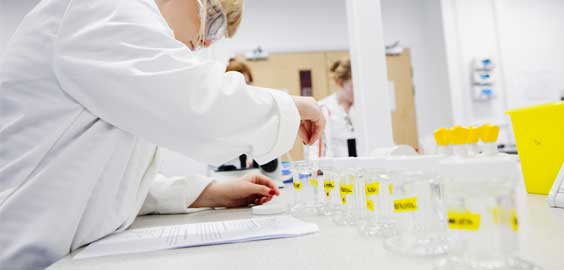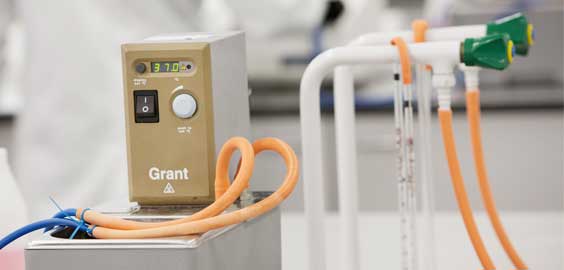Biotechnology MSc
2 Years Part-Time | September Start
 Option for Placement Year
Option for Placement Year
 Option for Study Abroad
Option for Study Abroad

International
Northumbria’s global footprint touches every continent across the world, through our global partnerships across 17 institutions in 10 countries, to our 277,000 strong alumni community and 150 recruitment partners – we prepare our students for the challenges of tomorrow. Discover more about how to join Northumbria’s global family or our partnerships.
View our Global FootprintBusiness
The world is changing faster than ever before. The future is there to be won by organisations who find ways to turn today's possibilities into tomorrows competitive edge. In a connected world, collaboration can be the key to success.
More on our Business ServicesResearch
Northumbria is a research-rich, business-focused, professional university with a global reputation for academic quality. We conduct ground-breaking research that is responsive to the science & technology, health & well being, economic and social and arts & cultural needs for the communities
Discover more about our ResearchAlumni
Northumbria University is renowned for the calibre of its business-ready graduates. Our alumni network has over 237,000 graduates based in 178 countries worldwide in a range of sectors, our alumni are making a real impact on the world.
Our AlumniIf you’d like to receive the latest updates from Northumbria about our courses, events, finance & funding then enter your details below.
* At Northumbria we are strongly committed to protecting the privacy of personal data. To view the University’s Privacy Notice please click here
 Option for Placement Year
Option for Placement Year
 Option for Study Abroad
Option for Study Abroad

Recent and relevant biotechnological research is at the heart of our programme and will culminate in your final module: a 60-credit independent research project, in which you design and implement your own research, and present, analyse and communicate your data. It is excellent preparation for a PhD or a research job in the industry.
Given the common expectation for job candidates to have some form of postgraduate qualification, this part-time Masters course offers a route to careers in biotechnology as well as the broader life sciences industry. If your first degree included the study of genetics and molecular biology, and a research module, you're well-placed to join us.
Check out all of our available part time study options and discover the course that best suits you.
Level of Study
Postgraduate
Mode of Study
2 years Part Time
1 other options available
Department
Applied Sciences
Location
City Campus, Northumbria University
City
Newcastle
Start
September 2024
Fees
Fee Information
Modules
Module Information
Explore our immersive 360 tours, informative subject videos, inspirational student profiles, ground-breaking research, and a range of life at university blogs videos and articles.
Teaching can start in the lab or classroom and then you make the material your own by exploring and applying it. Technology Enhanced Learning makes this easier; each module has an electronic blackboard site with relevant information including electronic reading lists and access to websites, videos and other study materials that are available anytime, anywhere.
You will undertake assignments within small groups and we provide training in communication skills relevant for scientific communication. The course aims to foster your ability to work at a professional standard both individually and as part of a team.
Take a look at what Northumbria has to offer and discover what studying with us can do for you.
Our teaching team maintains close links with biotech companies and research labs, including via ongoing roles as consultants, which helps ensure an up-to-date understanding of the latest technical and commercial developments. Several academics are involved in biotech ventures that make use of the University’s facilities: Nzomics Biocatalysis develops enzyme alternatives to chemical processes, and Nu-omics offers DNA sequencing services.

Dr Rinke Vinkenoog
Programme Leader

Dr Lynn Dover
Reader in Microbial Physiology

Dr Meng Zhang
Senior Lecturer

Dr Seth Racey
Senior Lecturer
Take a look at what Northumbria has to offer and discover what studying with us can do for you.
For cell biology and immunology, we have two multi-user laboratories. Technologies include assays for measuring immune responses at the single-cell level, and for monitoring the functioning of cells in real time. Further capabilities include biomarker analysis, flow cytometry, chemical imaging and fluorescence microscopy. For genomics, proteomics and metabolomics, our capabilities include genomic sequencing, mass spectrometry, 2D protein electrophoresis and nanoflow liquid chromatography.
All our equipment is supported up by highly skilled technical staff who will help you make the best use of all the facilities that are available.

Facilities
Read more about our specialist laboratories

Virtual Tour
Explore our campus facilities with 360 panoramas of the Department of Applied Sciences
Take a look at what Northumbria has to offer and discover what studying with us can do for you.
As a student, you will be heavily engaged in analysing recent insights from the scientific literature. You will undertake a major individual project in molecular and cellular science that will encompass all aspects of a scientific study. These include evaluation of relevant literature, design and set-up of experiments, collection and processing of data, analysis of results, preparation of a report and presentation of findings in a seminar.
Take a look at what Northumbria has to offer and discover what studying with us can do for you.
Employers are looking for the ability to solve problems, think critically, work with others and function independently – which are exactly the attributes that our course develops to a higher level.
During your time at Northumbria, we encourage you to participate in the activities organised by the Career Development Service. We also encourage you to apply for associate membership of the Royal Society of Biology, with full membership becoming possible once you have at least three years’ postgraduate experience in study or work.
Take a look at what Northumbria has to offer and discover what studying with us can do for you.
With an MSc Biotechnology, you will be ready to contribute to the changes ahead through a rigorous scientific approach and your grasp of the fundamental knowledge, insights and skills that underlie modern biotechnology.
Scientific research is at the heart of the course and you will strengthen pivotal skills that will enhance your employability in any research-rich environment. By developing the practices, standards and principles relevant to becoming a bioscience professional, you will also prepare yourself for success in other sectors of the life sciences industry and beyond.
Take a look at what Northumbria has to offer and discover what studying with us can do for you.
Applicants should normally have:
A minimum of a 2:2 honours degree in a subject related to biology or biotechnology, including the study of genetics and molecular biology.
International qualifications:
If you have studied a non UK qualification, you can see how your qualifications compare to the standard entry criteria, by selecting the country that you received the qualification in, from our country pages. Visit www.northumbria.ac.uk/yourcountry
English language requirements:
International applicants are required to have a minimum overall IELTS (Academic) score of 6.5 with 6 in each component (or approved equivalent*).
*The university accepts a large number of UK and International Qualifications in place of IELTS. You can find details of acceptable tests and the required grades you will need in our English Language section. Visit www.northumbria.ac.uk/englishqualifications
Full UK Fee: £9,250
Full EU Fee: £19,750
Full International Fee: £19,750
Scholarships and Discounts
ADDITIONAL COSTS
Laboratory equipment such as spatula, lab book, marker pens and a scientific calculator are required and should cost no more than £25. You may be required to print some documents this should be no more than £10 per academic year.
* At Northumbria we are strongly committed to protecting the privacy of personal data. To view the University’s Privacy Notice please click here
Module information is indicative and is reviewed annually therefore may be subject to change. Applicants will be informed if there are any changes.
AP0700 -
Graduate Science Research Methods (Core,20 Credits)
This module will provide you with an opportunity to develop your skills in the use and understanding of relevant literature and in both quantitative and qualitative methods. You will learn how to evaluate and contribute to the scientific literature and to interpret and disseminate scientific information. You will appreciate the desirable properties of research design and be able to select an experimental design appropriate to a given system and create the design matrix. You will learn how to assess the kinds of scientific data and tests of hypotheses and will be able to select, apply, and interpret the output from statistical methods of data analysis, and to evaluate the results of statistical analyses as applied to a given data set. Using contemporary science stories, you will develop scientific communication skills in systematic searching, summary writing and critical analysis of the underpinning primary research.
More informationAP0701 -
Molecular Biology (Core,20 Credits)
You will learn to evaluate recent developments in molecular biology in the context of the new techniques that have been developed, which will be assessed by an online test, demonstrate an ability to perform skilled laboratory techniques in a competent and safe manner, which is assessed by practical report, and evaluate laboratory results in the form of a scientific paper, which is assessed by practical report. You will also learn to demonstrate an awareness of the wider social and political implications of the topics covered in the module.
More informationAP0704 -
Industrial Biotechnology (Core,20 Credits)
You will explore various aspects of industrial microbial biotechnology and see how it contributes to the global goal of sustainable industrial development, using easily obtainable renewable feed-stocks to generate a wide range of useful (often biodegradable) products while avoiding the use of environment-damaging materials like petrochemicals. You will explore the development of traditional biotechnology industries such as the production of amino acids as food additives and the treatment of waste waters and the bioreactors they use. You will also learn about the use of enzymes in industry and explore the production of a complex enzyme preparation using bioreactors in the laboratory. You will learn how production strains of microorganisms were isolated and traditionally improved using biochemical principles. You will learn how the advent of genomic analyses facilitates analysis of hyper-producing strains to understand their productivity and how they can now be rationally designed using the genomic information in the future. Throughout the module you will consider the practicalities of operating at an industrial scale.
More informationAP0705 -
Current Topics in Biotechnology (Core,20 Credits)
Biotechnology is a fast moving and growing field of science, that impacts on our society and our lives. In this module, you will explore several areas of biotechnology.
You will learn about genetically modified plants and animals. What is the scientific background of genetic modification – how is it done, what are the implications, why do we need genetically modified organisms – do we actually need them? You will learn about the different methodologies of transferring DNA into plants and animals, about the selection mechanisms involved, and about the ectopic expression of the transgenes, and about the effects (wanted and unwanted) on both the host species and the natural or agricultural environment. You will study a number of case studies in depth, looking at all aspects of the problem and its supposed biotechnological solution.
Biotechnology is of growing importance in the medical world as well. How can we apply our biotechnological and molecular genetic knowledge in the fight against disease? You will learn about the role of cell therapies in creating “future cures”, with a focus on stem cell technologies and the production and handling of cell based products.
You will also explore the controversy around biotechnological methods and applications. You will learn about the ethical, legal and social issues surrounding genetic modification and stem cell research, and get insight into the regulatory bodies, commercial, governmental and social pressures that drive medical biotechnology product development.
AP0702 -
Bioinformatics (Core,20 Credits)
You will learn the fundamental importance of bioinformatics to 21st century biology and how it is applied to the investigation of bacterial sequences. Topics include:
•Utilisation of databases for the analysis of nucleotide and amino-acid sequences, including introduction to the algorithms used in sequence alignment and sequence searching
•Practical experience of sequence analysis using freely available bioinformatics tools, looking at nucleotide, protein, and genome databases. These tools include BLAST, SWISS-Prot, PubMed, UCSC Genome Browser
•Microbial DNA sequencing and next-generation sequencing
•Genome annotation and analysis of SNPs.
•The importance of molecular phylogeny
•Genome editing using CRISPR-Cas
•Proteomics, covering protein structure analysis and identification of common motifs
AP0703 -
Subject Exploration (Core,20 Credits)
This module allows you to explore a topic related to your Masters programme of your own choosing to an advanced level developing a critical appreciation of the methodologies, recent advances and future potential in that field. In doing so, you will develop and refine your research skills including information retrieval, evaluative, analytical, and problem solving skills together with group-based written and oral communication skills.
More informationAP0708 -
Applied Sciences Research Project (Core,60 Credits)
This module provides you with a vehicle for developing, refining and applying your research skills in an independent project. Guided by a staff member, you will plan, carry out and report the outcomes of an independent research project to professional standards. You will identify stakeholders in your research and describe the projected impact your research holds for them. In order to prepare you for life as a research professional, assessments emulate authentic professional documentary formats aimed at securing project resources and disseminating your findings to ensure they develop real world impact.
More informationModule information is indicative and is reviewed annually therefore may be subject to change. Applicants will be informed if there are any changes.
AP0700 -
Graduate Science Research Methods (Core,20 Credits)
This module will provide you with an opportunity to develop your skills in the use and understanding of relevant literature and in both quantitative and qualitative methods. You will learn how to evaluate and contribute to the scientific literature and to interpret and disseminate scientific information. You will appreciate the desirable properties of research design and be able to select an experimental design appropriate to a given system and create the design matrix. You will learn how to assess the kinds of scientific data and tests of hypotheses and will be able to select, apply, and interpret the output from statistical methods of data analysis, and to evaluate the results of statistical analyses as applied to a given data set. Using contemporary science stories, you will develop scientific communication skills in systematic searching, summary writing and critical analysis of the underpinning primary research.
More informationAP0701 -
Molecular Biology (Core,20 Credits)
You will learn to evaluate recent developments in molecular biology in the context of the new techniques that have been developed, which will be assessed by an online test, demonstrate an ability to perform skilled laboratory techniques in a competent and safe manner, which is assessed by practical report, and evaluate laboratory results in the form of a scientific paper, which is assessed by practical report. You will also learn to demonstrate an awareness of the wider social and political implications of the topics covered in the module.
More informationAP0704 -
Industrial Biotechnology (Core,20 Credits)
You will explore various aspects of industrial microbial biotechnology and see how it contributes to the global goal of sustainable industrial development, using easily obtainable renewable feed-stocks to generate a wide range of useful (often biodegradable) products while avoiding the use of environment-damaging materials like petrochemicals. You will explore the development of traditional biotechnology industries such as the production of amino acids as food additives and the treatment of waste waters and the bioreactors they use. You will also learn about the use of enzymes in industry and explore the production of a complex enzyme preparation using bioreactors in the laboratory. You will learn how production strains of microorganisms were isolated and traditionally improved using biochemical principles. You will learn how the advent of genomic analyses facilitates analysis of hyper-producing strains to understand their productivity and how they can now be rationally designed using the genomic information in the future. Throughout the module you will consider the practicalities of operating at an industrial scale.
More informationAP0705 -
Current Topics in Biotechnology (Core,20 Credits)
Biotechnology is a fast moving and growing field of science, that impacts on our society and our lives. In this module, you will explore several areas of biotechnology.
You will learn about genetically modified plants and animals. What is the scientific background of genetic modification – how is it done, what are the implications, why do we need genetically modified organisms – do we actually need them? You will learn about the different methodologies of transferring DNA into plants and animals, about the selection mechanisms involved, and about the ectopic expression of the transgenes, and about the effects (wanted and unwanted) on both the host species and the natural or agricultural environment. You will study a number of case studies in depth, looking at all aspects of the problem and its supposed biotechnological solution.
Biotechnology is of growing importance in the medical world as well. How can we apply our biotechnological and molecular genetic knowledge in the fight against disease? You will learn about the role of cell therapies in creating “future cures”, with a focus on stem cell technologies and the production and handling of cell based products.
You will also explore the controversy around biotechnological methods and applications. You will learn about the ethical, legal and social issues surrounding genetic modification and stem cell research, and get insight into the regulatory bodies, commercial, governmental and social pressures that drive medical biotechnology product development.
AP0702 -
Bioinformatics (Core,20 Credits)
You will learn the fundamental importance of bioinformatics to 21st century biology and how it is applied to the investigation of bacterial sequences. Topics include:
•Utilisation of databases for the analysis of nucleotide and amino-acid sequences, including introduction to the algorithms used in sequence alignment and sequence searching
•Practical experience of sequence analysis using freely available bioinformatics tools, looking at nucleotide, protein, and genome databases. These tools include BLAST, SWISS-Prot, PubMed, UCSC Genome Browser
•Microbial DNA sequencing and next-generation sequencing
•Genome annotation and analysis of SNPs.
•The importance of molecular phylogeny
•Genome editing using CRISPR-Cas
•Proteomics, covering protein structure analysis and identification of common motifs
AP0703 -
Subject Exploration (Core,20 Credits)
This module allows you to explore a topic related to your Masters programme of your own choosing to an advanced level developing a critical appreciation of the methodologies, recent advances and future potential in that field. In doing so, you will develop and refine your research skills including information retrieval, evaluative, analytical, and problem solving skills together with group-based written and oral communication skills.
More informationAP0708 -
Applied Sciences Research Project (Core,60 Credits)
This module provides you with a vehicle for developing, refining and applying your research skills in an independent project. Guided by a staff member, you will plan, carry out and report the outcomes of an independent research project to professional standards. You will identify stakeholders in your research and describe the projected impact your research holds for them. In order to prepare you for life as a research professional, assessments emulate authentic professional documentary formats aimed at securing project resources and disseminating your findings to ensure they develop real world impact.
More informationThe following alternative study options are available for this course:
Sep start
Our Applicant Services team will be happy to help. They can be contacted on 0191 406 0901 or by using our Contact Form.
Northumbria University is committed to developing an inclusive, diverse and accessible campus and wider University community and are determined to ensure that opportunities we provide are open to all.
We are proud to work in partnership with AccessAble to provide Detailed Access Guides to our buildings and facilities across our City, Coach Lane and London Campuses. A Detailed Access Guide lets you know what access will be like when you visit somewhere. It looks at the route you will use getting in and what is available inside. All guides have Accessibility Symbols that give you a quick overview of what is available, and photographs to show you what to expect. The guides are produced by trained surveyors who visit our campuses annually to ensure you have trusted and accurate information.
You can use Northumbria’s AccessAble Guides anytime to check the accessibility of a building or facility and to plan your routes and journeys. Search by location, building or accessibility feature to find the information you need.
We are dedicated to helping students who may require additional support during their student journey and offer 1-1 advice and guidance appropriate to individual requirements. If you feel you may need additional support you can find out more about what we offer here where you can also contact us with any questions you may have:
If you’d like to receive the latest updates from Northumbria about our courses, events, finance & funding then enter your details below.
* At Northumbria we are strongly committed to protecting the privacy of personal data. To view the University’s Privacy Notice please click here
Open Days are a great way for you to get a feel of the University, the city of Newcastle upon Tyne and the course(s) you are interested in.
Information about all of our tuition fees, funding and scholarships.
Get an insight into life at Northumbria at the click of a button! Come and explore our videos and 360 panoramas to immerse yourself in our campuses and get a feel for what it is like studying here using our interactive virtual tour.
Back to top